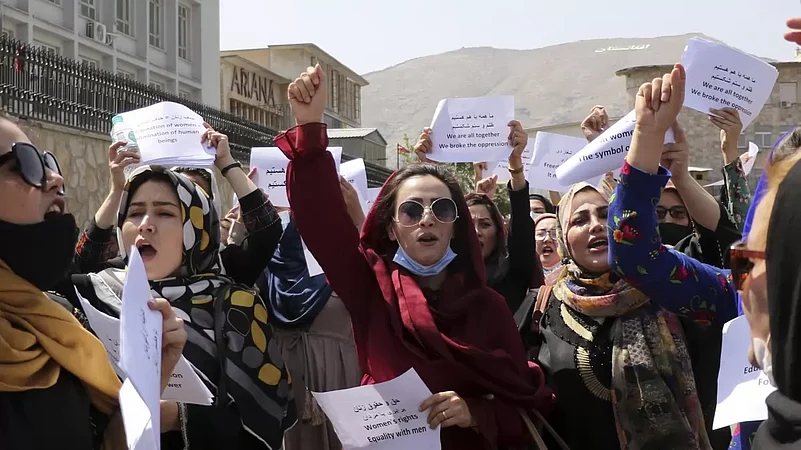The Taliban's move ordering non-governmental groups in Afghanistan to stop employing women has sparked intense international outrage, with many saying the ban will disrupt vital and life-saving assistance to millions.
International Outrage Against Taliban's Decision To Forbid Women From Working For NGOs
The Taliban's order says that any non-governmental organization found not complying with the ban will have their operating license revoked in Afghanistan.

The Taliban takeover last year sent Afghanistan's economy into a tailspin and transformed the country, driving millions into poverty and hunger. Foreign aid stopped almost overnight. Sanctions on Taliban rulers, a halt on bank transfers and frozen billions in Afghanistan's currency reserves have already restricted access to global institutions and the outside money that supported the country's aid-dependent economy before the withdrawal of U.S. and NATO forces.
“Women are central to humanitarian operations around the world," US Secretary of State Blinken said Saturday. "This decision could be devastating for the Afghan people.”
NGOs employing women will have their licences revoked
The NGO order came in a letter from Economy Minister Qari Din Mohammed Hanif. It said any organization found not complying with the order will have their operating license revoked in Afghanistan. It is the latest blow to female rights and freedoms since the Taliban seized power last year and follows sweeping restrictions on education, employment, clothing and travel.
The U.N. Secretary-General Antonio Guterres said he was deeply disturbed by reports of the ban. “The United Nations and its partners, including national and international non-governmental organizations, are helping more than 28 million Afghans who depend on humanitarian aid to survive,” he said in a statement.?
Aid agencies and NGOs are expected to make a statement Sunday. Meanwhile, the move has sparked strong international condemnation, with Ministers and officials taking to twitter to demand a withdrawal on the bans curtailing women's freedoms in the country.
Women-led protests against Taliban's blow to female rights
The Taliban's repeated incursions into women's lives and orders curtailing their rights and freedoms have?triggered backlash overseas and demonstrations in major Afghan cities.
At around midnight Saturday in the western city of Herat, where earlier protesters were dispersed with water cannons, people opened their windows and chanted “Allahu Akbar (God is great)” in solidarity with female students.
In the southern city of Kandahar, also on Saturday, hundreds of male students boycotted their final semester exams at Mirwais Neeka University. One of them told The Associated Press that Taliban forces tried to break up the crowd as they left the exam hall.
“They tried to disperse us so we chanted slogans, then others joined in with the slogans,” said Akhbari, who only gave his last name. “We refused to move and the Taliban thought we were protesting. The Taliban started shooting their rifles into the air. I saw two guys being beaten, one of them to the head.”
A spokesman for the Kandahar provincial governor, Ataullah Zaid, denied there was a protest. There were some people who were pretending to be students and teachers, he said, but they were stopped by students and security forces.
Spate of restrictions
Women have slowly been squeezed out of public life in Taliban-ruled Afghanistan, with schools being closed, keeping universities out of their reach, pushed out of many government jobs, or being paid a fraction of their salary to stay at home. They are also barred from travelling without a male relative and must cover up in public, and are prohibited from going to parks, fairs, gyms and public baths.
Secondary schools for girls have also been closed across most of the country since March -- also temporarily, according to the Taliban, although they have offered a litany of excuses for why they haven't re-opened in the long span.
Furthermore, the authorities had also closed those madrassas that were teaching only women students but were housed inside mosques.?
Despite promising a softer rule when they seized power more than a year ago, the Taliban have ratcheted up restrictions on all aspects of women's lives. Ever since the Taliban seized control, universities were forced to implement new rules including gender-segregated classrooms and entrances, while women were only permitted to be taught by professors of the same sex, or old men.
Taliban's rule
The Taliban propagate an austere version of Islam, with the movement's supreme leader, Hibatullah Akhundzada, and his inner circle of clerics?voicing opposition against modern education, especially for girls and women.
In the 20 years between the Taliban's two reigns, girls were allowed to go to school and women were able to seek employment in all sectors, though the country remained socially conservative.
(With inputs from AP)
-
Previous Story
 NYC Mayor Eric Adams Confuses India And Pakistan In Gaffe At Queens India Day Parade
NYC Mayor Eric Adams Confuses India And Pakistan In Gaffe At Queens India Day Parade - Next Story


















